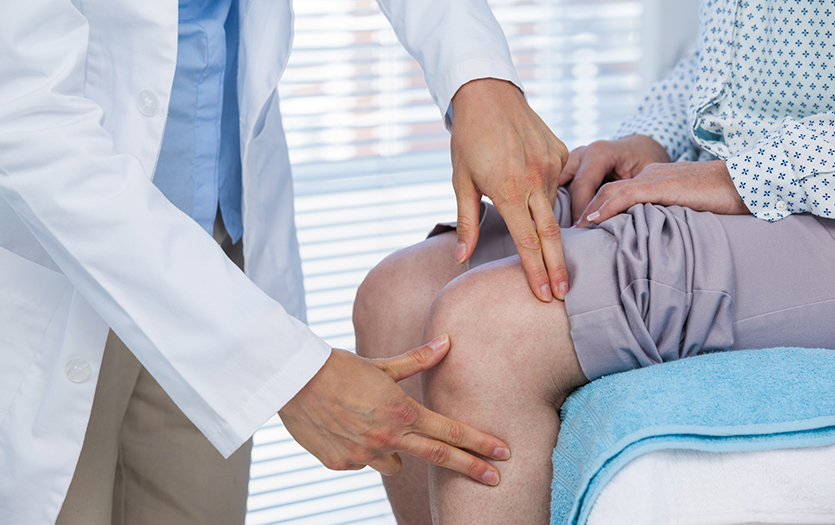
This post was written by Kyle Carlson, DO, PPG - Orthopedics.
Many people will experience arthritis-induced joint pain in their lives and may need total joint replacement surgery. According to the Centers for Disease Control and Prevention (CDC), approximately one in four adults living with arthritis—15 million people—report experiencing severe joint discomfort. Dealing with joint pain can be challenging, but understanding your options is the first step towards relief. Here, we'll address commonly asked questions about joint pain and replacements to help you better navigate your treatment options.
How do I know arthritis is causing my joint pain?
Joint pain with activity is a common symptom among people diagnosed with arthritis. Osteoarthritis, or degenerative arthritis, occurs when the joint no longer has cartilage protecting the inside of the knee or hip. The lack of lubrication causes painful "bone on bone" contact with movement.
During a physical exam, a patient may have pain along the knee joint line with knee arthritis or pain in their groin with range of motion in hip arthritis. Imaging, such as X-rays of the joint, can help diagnose arthritis for hip and knee pain. These findings may show joint space narrowing, cystic changes and osteophytes (bone spurs).
There are other reasons that someone might experience joint pain, but with a good history, physical exam and imaging, your surgeon can diagnose your arthritis and help determine the next step in treatment.
I don't want to have surgery yet. What can I do in the meantime for my pain?
There are many non-surgical options for treating hip and knee arthritis. The American Academy of Orthopedic Surgeons (AAOS) provides updated practice guidelines every few years for the non-operative management of hip and knee arthritis. The AAOS recommendations are founded on clinical research and patient outcomes. As such, there is strong evidence for using anti-inflammatory medications (oral and topical), supervised exercise programs like physical therapy and patient education. Additionally, moderate evidence supports the use of canes, braces, weight reduction and cortisone injections to manage joint pain effectively.
Based on the AAOS recommendations, there is evidence against the use of hyaluronic injections (viscosupplementation) and narcotic medications for non-operative management of joint arthritis. Although the AAOS doesn't recommend the use of hyaluronic injections, this doesn't mean that they are unsafe or ineffective. The recommendation against their use refers to research that demonstrates these injections may be less effective than initially believed and that cortisone injections provide patients with more relief.
For more information on non-surgical pain management options, check out this post.
When is the right time to have surgery for my joint pain?
If your pain is severe enough to wake you up at night, prevent you from doing what you want or cause you to avoid enjoyable activities because you're worried about joint pain, then it's time to discuss joint replacement surgery.
Joint replacement surgery aims to reduce the pain in that joint and allow patients to return to activities they enjoy with minimal discomfort. This procedure is not recommended to patients with little to no joint pain with activity or as a preventive measure before their arthritis gets "too bad."
It's most beneficial when done for the right reasons. Speak with your primary care provider or orthopedic surgeon to help determine the right time to undergo surgery.
What is recovery like after joint replacement surgery?
Every patient will recover at a different rate following joint replacement. Activity levels and mobility before surgery significantly influence healing time. The more active and mobile the patient is preoperatively, the quicker they will return to that level of activity postoperatively.
A typical timeline for joint replacement recovery includes using a gait aid (a walker) for one to two weeks and a cane for another two weeks. By four to six weeks, patients should be walking unassisted. Most return to full activity without restrictions by three months. Most patients undergoing joint replacement can return home the same day of surgery if they have adequate help at home and feel safe to do so.
Am I healthy enough for joint replacement?
Joint replacement surgery for the treatment of arthritis is an elective surgery. It is essential to optimize patient health as much as possible before their procedure. Doing so will lower the risk of perioperative complications and improve postoperative outcomes.
Common factors that put patients at an increased risk of perioperative complications include, but are not limited to, diabetes, obesity and smoking/tobacco use. The exact cutoff or goal for these factors can vary from surgeon to surgeon, but typically, an A1c less than 7.5 mg/dL for diabetic patients, a BMI less than 40kg/m2 for obesity and no use of tobacco or nicotine products for six weeks prior and six weeks after surgery. Discuss these and other health factors with your surgeon to optimize your well-being and reduce the risk of poor outcomes or complications.
How long will my joint replacement last?
Today's joint replacements last much longer than previous generations. New technology in implant production and advancements in the procedure itself have made this possible. The most significant change in the implant that has affected its longevity or survivorship is the improvement of the joint's plastic bearing or liner. With modern implants, 95% of joint replacements are still fully functional after 15 years, and this trend should continue for many years.
A younger patient who undergoes joint replacement may need additional surgery many years later if theirs wears out. However, the goal is to significantly improve their quality of life after their replacement so they can enjoy their life now. In general, patients can expect their joint replacement to last at least 15-20 years before needing replacement due to wear and tear.
Final thoughts
Understanding your options for managing joint pain and seeking the proper treatment can significantly improve your quality of life. Whether you're considering non-surgical interventions or exploring joint replacement surgery, we're here to help. At Parkview, we offer a full range of services to help you get moving again.
Surgeries at Parkview Ortho Hospital are performed by the board-certified orthopedic specialists of Ortho NorthEast (ONE). To schedule orthopedic care in Allen County, call Ortho NorthEast at 260-484-8551 or request an appointment online here. For orthopedic care outside of Allen County, find a provider near you using our location search tool here.



